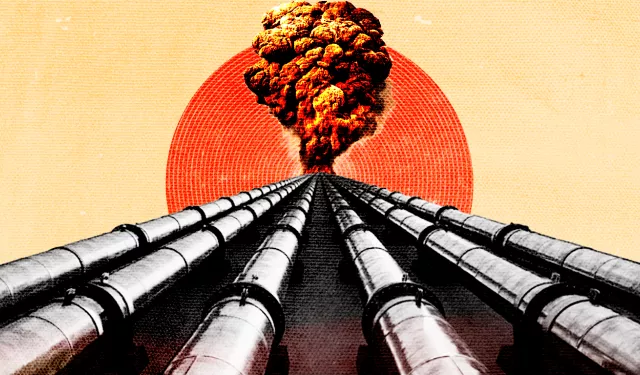
Is Egypt hooked on Israeli gas?
Risks outweigh gains
On August 7, Israel’s energy minister announced what he described as a historic agreement with Egypt to expand natural gas exports by an additional 130 billion cubic meters beyond the volumes stipulated in the existing arrangement. The long-term agreement, valued at $35 billion, is set to run until 2040.
The announcement immediately triggered debate across social media platforms and beyond. Critics objected to the deal itself, or in some cases, to its timing and the political sensitivity of its public disclosure.
Supporters, by contrast, framed the agreement as a pragmatic response to Egypt’s growing energy demand while pointing to reports suggesting Cairo may be securing a preferential purchase price under terms that would guarantee part of its energy supply for years to come.
Politics, security, and economics
One group of opponents bases its rejection purely on political grounds, linking the deal to Israel’s ongoing and merciless war of extermination in the Gaza Strip since October 2023. From their perspective, any normalization between Egypt and Israel undermines solidarity with the Palestinian people, especially coming from the most populous Arab nation.
Another group builds its opposition on grounds of security, pointing to using gas as leverage due to strategic incompatibilities between Egypt and Israel in light of the Gaza war, particularly the issue of transferring Palestinians from Gaza, which could only happen at Egypt’s expense in one form or another.
Even if such concerns never materialize, these critics argue that raising energy dependence on an aggressive state led by extremist factions, is inherently risky, given natural gas’s central role in Egypt’s electricity generation and broader energy mix. They invoke the example of EU member states that relied heavily on Russian gas prior to the Ukraine war.
Recent events reinforce these concerns. At the onset of Israel’s war on Gaza, gas flows to Egypt were halted, triggering an unprecedented electricity load-shedding crisis and forcing energy-intensive industries to shut down. In the case of a supplier with Israel’s aggressive profile, critics warn, such interruptions could become the rule rather than the exception.
Where is Egypt’s gas?
The matter is without doubt serious. According to 2023 data from the International Energy Agency/IEA, natural gas has become Egypt’s primary source of energy, accounting for 48.7% of the total compared with 43.8% for oil. This is mainly because Egypt’s electricity sector relies heavily on natural gas, which accounted for almost 76% of generation in 2023.
The shift towards natural gas for power generation once seemed logical, given the massive discoveries announced in 2015 and 2016. Those finds not only met rising domestic demand but also allowed for export expansion particularly during the 2022 Ukraine crisis, and fueled official talk of turning Egypt into a hub for exporting and re-exporting Eastern Mediterranean gas.
In fact, Egypt’s natural gas production doubled between 2015 and 2021, jumping from 1.309 million terajoules to 2.431 million terajoules. But production then plunged dramatically to just 2.048 million in 2023, and has continued to fall for reasons never officially explained.
The balance tips towards the enemy
Against this backdrop, Egypt began importing natural gas from Israel after signing a partnership agreement with the EU and Israel in 2022.
Initially, the plan was to import Israeli gas for re-export to Europe through Egypt’s liquefaction plants in Idku and Damietta. But as domestic production continued to decline sharply, imports from Israel increasingly went to meet Egypt’s growing local demand. By early this year, Israeli gas flows were estimated to make up about 14% of Egypt’s domestic market supply.
The new deal signals a further rise in Egypt’s dependence on Israeli gas, not for re-export to Europe, which would involve a third-party stakeholder and thus a safeguard for continued supply, but within a purely bilateral arrangement.
Egypt will be relying directly on a state that may not be an official enemy, but nonetheless poses serious strategic risks. Chief among these risks are the transfer issue and the sensitive Gaza border.
That reality diminishes the significance of the new deal’s long-term nature or any supposed preferential pricing—terms that, in any case, remain unconfirmed despite being touted by some as a key gain.
From an economic perspective, ignoring the political and security dimensions, the relationship does not appear to be one of mutual dependence. Although the deal’s total value is large —$35 billion over 15 years— Israel’s export structure is not heavily reliant on raw materials, including energy.
In 2024, energy exports accounted for just 7.3% of Israel’s total export value, compared with 50% for high-technology, science-based, and skilled-labor products such as electrical and electronic equipment (21%), medical devices (12%), machinery and boilers (8.3%), aircraft parts (3.5%), pharmaceuticals (3%), and weapons (2.9%).
Averaged over the deal’s term, the annual value would be about $2.3 billion, roughly 3.8% of Israel’s total exports in 2024. While not insignificant, this share is far from dominant, meaning it would not be enough to deter any future Israeli government from using Egypt’s dependence on its gas supplies as leverage, whether on the transfer issue or other matters.
That displacement plan has been openly promoted by Israel’s current government as part of US President Donald Trump’s proposal to empty Gaza of its residents, a plan that in its original form addressed Egypt and Jordan about taking in Gazans just six months ago.
Published opinions reflect the views of its authors, not necessarily those of Al Manassa.
